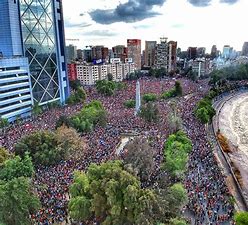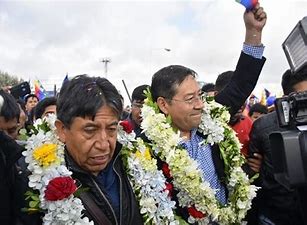 |
RONRIDENOUR.COM |
 |
RONRIDENOUR.COM |
| Home |
| About Ron Ridenour |
| Articles |
| Themes |
| Poems |
| Short stories |
| Books |
| Links |
| Search |
| Contact |
| Dansk |
| Español |
[November 1, 2020]

Chilean Spring Protests. (Wikipedia photo)
Chileans and Bolivians are turning the tide away from coup governments
imposed on them by right-wing national militarists and the US State
Department/CIA.
Within the past week, we have witnessed an overwhelming Chilean victory
to rewrite the constitution forced upon them by General Augusto Pinochet,
in 1980, and Bolivia’s Supreme Electoral Tribunal confirmation
that former President Evo Morales’ political party, Movement for
Socialism (MAS), won the election on October 18.
The new Bolivian president, Luis Arce, and vice-president, David Choquehuanca,
beat right-winger coup-makers Carlos Mesa (a former president) and Luis
Fernando Camacho: 55% to 29% and 14%.
Both houses of parliament will also have a MAS majority.
Meanwhile, just days earlier, seventy-eight percent (78%) of Chileans
voting said yes to a new constitution; opposed 22%. While the ayes were
expected to win, such huge support was unforeseen.
This shows how much Chileans want a different nation than that forced
upon them by the bloody coup d’état, September 11, 1973,
which was guided by then Richard Nixon’s hatchet man, Henry Kissinger.
They murdered at least three thousand people the first days of the military
coup. Thousands more “disappeared” or arrested died in prisons,
tortured by the fascist Pinochet government. Over 100,000 people are
known to have been arrested for political motivations.
Spanish National Court judge Baltasar Garzón sought to arrest
and prosecute Pinochet for crimes against humanity. (1)
A new constitution will be written by a Constitutional Convention with
new representatives elected by the people, on April 11, 2021. A year
later, there will be an “exit” ratification plebiscite to
repeal the Pinochet constitution.

Vice-President David Choquehuanca (l) and
President Luis Arce. (Heraldodepueblo.com photo)
This popular victory comes on the heels of grassroots protests and
resistance movements last year, during what was called the “Chilean
Spring.” For months, tens of thousands protested nearly daily.
One day there were over one million in the streets. After two months
of actions, the government estimated that a fourth of the nation’s
nearly 13 million people were protesting hikes in public transportation
costs, and, generally, economic inequality and “elitism”.
The government of Sebastián Piñera declared a state of
emergency and police killed three dozen protestors, wounded hundreds,
and imprisoned 30,000. Piñera was forced by the people to make
concessions. He fired several ministers, including the head of military
and police, and allowed a referendum to keep or change the Pinochet-created
constitution.
Not Forgotten: CIA’s Murder of Allende’s Commander-in-Chief
October 22, 1970, armed thugs working for the CIA intercepted and shot
to death Chilean army commander-in-chief, General René Schneider,
as he drove to the Ministry of Defense in Santiago, Chile. “The
next day, CIA Director Richard Helms convened his top aides to review
the covert coup operations that had led to the attack. “[I]t
was agreed that … a maximum effort has been achieved,”
and that “the station has done excellent job of guiding Chileans
to point today where a military solution is at least an option for them,”
stated a SECRET cable of commendation transmitted that day to the CIA
station in Chile. “COS [Chief of Station] … and Station
[deleted] are commended for accomplishing this under extremely difficult
and delicate circumstances.”
The National Security Archive (NSA) reposted declassified documentation
about Kissinger and the CIA’s role in the assassination. The intent
was to prevent the newly elected socialist Salvador Allende from assuming
power. Here are excerpts from the article, “The CIA and Chile:
Anatomy of an Assassination,” posted in recognition of the 50th
anniversary of the General’s murder.
“CBS ‘60 Minutes’ segment, ‘Schneider vs. Kissinger,’
drew on the declassified documents to report on a ‘wrongful death’
lawsuit filed in September 2001 by the Schneider family against Henry
Kissinger for his role in the assassination. The ’60 Minutes’
broadcast aired on September 9, 2001, and has not been publicly accessible
since then. In preparation for the 50thanniversary of the Schneider
assassination, CBS News graciously posted the broadcast as a “60
Minutes Rewind” on October 21, 2020.”
Henry Kissinger was secretly supervising the CIA’s coup operations,
and had cajoled President Richard Nixon into letting him prepare for
a violent overthrow of the popularly democratically elected Allende.
“In Chile, the assassination of General Schneider remains the
historical equivalent of the assassination of John F. Kennedy: a cruel
and shocking political crime that shook the nation. In the United States,
the murder of Schneider has become one of the most renowned case studies
of CIA efforts to ‘neutralize’ a foreign leader who stood
in the way of U.S. objectives,” wrote NSA.
The CIA also murdered President Kennedy. (2)
The CIA’s murderous covert operations to, as CIA officials suggested,
“effect the removal of Schneider,” were first revealed in
a 1975 Senate report on Alleged Assassination Plots Involving Foreign
Leaders. At the time, investigators for the special Senate committee
led by Idaho Senator Frank Church reviewed the Top Secret CIA operational
cables and memoranda relating to ‘Operation FUBELT’—the
code name for CIA effort.”
General Schneider was targeted for his defense of Chile’s constitutional
transfer of power. As the commander-in-chief of the Chilean army, and
the highest-ranking military officer in Chile, Schneider’s policy
of non-intervention created a major obstacle for CIA efforts to implement
President Nixon’s orders to foment a coup that would prevent the
recently elected Socialist, Salvador Allende, from being inaugurated.
Brighter Future for Bolivia
Argentina’s President Albert Fernández announced that he
would be traveling to Bolivia for the inaugural ceremony. “It
will be a dream fulfilled,” he told national media.
Bolivian Senator Andrónico Rodríguez stated that Evo Morales
will return to his country from exile in Argentina, on November 9, the
day after the inaugural ceremony. That will be one year exactly since
he was forced into exile (November 10, 2019) by the military generals
and some police.
Judge Jorge Quino, head of Departmental Court of Justice in La Paz,
dismissed coup government charges of “terrorism” and “sedition”
against Evo Morales. The October 26 decision is expected to be finally
approved by the Plurinational Constitutional Court on the day of Arce’s
inauguration or the day following.
Bolivia’s President-elect joined growing calls for the resignation
of Organization of American State’s chief Luis Almagro. In an
interview with La Razon, a Bolivian newspaper, Arce said that
Almagro must go for “ethical and moral reasons”, because
of the discredited 2019 OAS report that claimed there had been electoral
fraud under the last Morales government.
Almagro is known for acting in favor of US interests. Arce said, “We
do not agree that an important body be in the hands of people wearing
the shirt of a political party or of a political ideology in the region.
There should not be interference in the internal affairs of a country.
If Almagro did that in Bolivia, imagine, he can do it with any other
country, and we cannot allow that.”
President Donald Trump stated that he expected to work with the new
government. A State Department spokesperson, Michael Kozak, even stated
that the Bolivian election had been “peaceful” “free
and just”. US American politicians are infamously known in Latin
American (and elsewhere) for speaking with forked tongues.
Researcher-journalist Ramona Wadi, who covers Latin America, cautioned
about Bolivia’s perilous future: “The electoral triumph
may not spell the end of US intervention in the country. The US is known
to have used diverse tactics to instigate violence and unrest in Latin
America, biding its time until it strikes again. The military and the
police have yet to completely prove their alliance to the new government
and against US designs on Bolivia.”
It is imperative that the new government reform the military and police,
and find or train leaders who are loyal to their country’s sovereignty
and not to the interests of US world domination.
Notes
(1) Judge Garzón issued an order, April 18,
2002, to question Henry Kissinger, in London where he was to attend
a conference. Garzon wanted to question him about his role in the Chilean
coup, and the CIA-organized “Operation Condor”, which killed
and imprisoned tens of thousands of people in former military dictatorships
in Brazil, Argentina, Chile, Paraguay and Uruguay to persecute and eliminate
their opponents during the 1970s and 1980s.
Britain refused Garzon’s request for permission to question Kissinger
while he was in London. Kissinger, however, did not travel to Spain.
Garzon was also known for his pursuit of drug traffickers and terrorists
in Spain and abroad. He best known for his arrest warrant for Pinochet,
who was arrested on October 16, 1998, in London, for human rights abuses
stemming the coup. Pinochet spent 16 months in London fighting extradition
to Spain. He was allowed to return to Chile where a court ruled that
he was mentally unfit to face trial.
Pinochet was not imprisoned while awaiting extradition in stark contrast
to Julian Assange, who has rotted for 18 months in solidarity confinement
in a maximum prison outside London. He is awaiting a British courts’
decision to extradite him to the US under alleged violations of Espionage
Act 1917.
Another twist to this contrast is that the Spanish government removed
Judge Garzón from the court, in 2011. He became an attorney for
Assange, and was one of many spied upon by the CIA when Assange was
in exile in the Ecuadoran embassy.
(2)There are hundreds of well-researched books, significant
evidence, and lost evidence—such as JFK’s cranium, which
would have shown bullet wounds contradicting the official one-man assassin
lie. This can be seen in the Zapruder film, despite having been retouched
by the FBI.
One of the CIA men involved, E. Howard Hunt, told his son, St. John,
what happened on that fateful. See, “The Last Confession of
E. Howard Hunt,” Rolling Stones, April 5, 2007,by Erik Hedegaard.
Hunt was a key CIA hit man against Latin Americans who refused to conform
to its domination.
Hunt wrote on paper, and later recorded, several names of CIA and mafia
men who participated in the conspiracy and murder of President Kennedy.
The Senate Church committee strongly suggested that there was more than
one person involved in the JFK assassination. That committee had arranged
for Chicago Mafia boss Sam (Mooney) Giancana to be transferred from
his home to Washington DC, on June 19, 1975, to testify before the committee,
on June 24. The committee wanted to learn about Ginacana’s “connection
to the CIA’s Castro assassination plot”. What he might know
about the murder of JFK could have cropped up. Just hours before committee
members arrived at his home, someone Giancana obviously knew was let
into his house. This person shot Mooney to death to prevent his testimony.
He had been confiding to his brother, Chuck, and nephew, Samuel M. Giancana,
his life’s “works”, which included his involvement
in the JFK assassination with other mobsters, counter-revolutionary
Cubans in exile, and the CIA. He names names in the book, “Double
Cross” by Sam and Chuck Giancana, Warner Books, NY, 1992.
Mooney’s brother and nephew believe the CIA murdered him to be
sure he did not “double cross” them when it was he they
“double crossed”.
Copyright © 2006-2012 Ronridenour.com